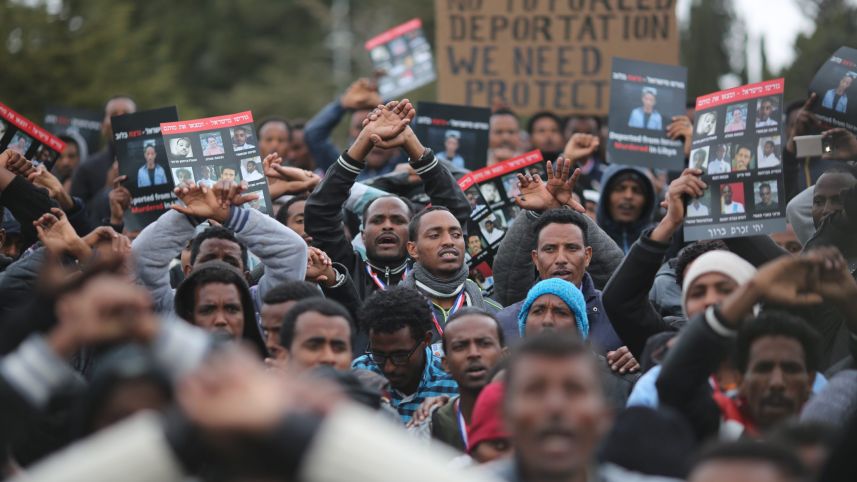Alwaght- More than 1,000 African refugees have held a protest rally in front of the Israeli Knesset (parliament) to voice their anger at the Tel Aviv regime’s policy of mass detention and deportation against them.
According to The Jerusalem protesters, mostly Eritreans and Sudanese, gathered outside the legislature as well as the Supreme Court in al-Quds (Jerusalem) on Thursday, while Wearing laminated Israeli Prison Services identification cards around their necks like scarlet letters.
Some were holding up banners reading, “Black lives matter,” and “Don’t force us to leave and look for refuge elsewhere.” Others were carrying pictures of the refugees, who had been deported.
Over 10,000 asylum seekers – mainly Sudanese and Eritreans – have been held at the Holot facility since it opened three years ago, with the state legally allowed to hold them there for a maximum of 12 months.
Although international law prohibits asylum seekers from being sent back to their homeland if it is a war zone or if it endangers their lives, Israeli regime has sought to strike deals with other African nations (so-called “third countries”) to take in some of them
However, the organizers of the Thursday march say asylum seekers who have been deported to third-party African states face the risk of being repatriated back to their homeland.
In a letter addressed to the Supreme Court justices, the organizers of the march denounced the deportation policy as “coercive”, saying, “This policy is cruel, illegal and unacceptable. We should not be imprisoned or thrown to other countries in Africa that are not ours and don’t accept us.”
Less than one percent of the asylum seekers have had their pleas recognized by the Israeli authorities since the regime signed the UN Refugee Convention around six decades ago.
During the march, Tekle Negash, a 21-year-old Eritrean refugee who came alone to Israel in 2012, said he has been kept in Holot for the past three months under “horrid” conditions.
“It’s very crowded, and there is only one shower and one toilet for us,” he said. “The food there is very bad, and in the summer it’s very hot, and in the winter it’s very cold. We can leave for 12 hours, but we are not allowed to work.”
Media reports in the past years have suggested that a number of African states have reached secret agreements with Tel Aviv, in which they accept unwanted refugees in return for arms, military training and other aid from Israel.
Last July, Benjamin Netanyahu went on a four-nation tour of sub-Saharan Africa, the first such visit by an Israeli prime minister to the continent in almost 30 years.
During the visit, Netanyahu reportedly discussed the eviction of thousands of migrants and refugees from Sudan and Eritrea who entered Israel through Egypt.
In 2015, The Washington Post reported that Israel had spent more than USD 350 million to build a fence along its entire border with Egypt to block the entry of Africans.
There are some 45,000 African asylum seekers in Israel. Ninety-two percent of those are from Eritrea and Sudan.



























